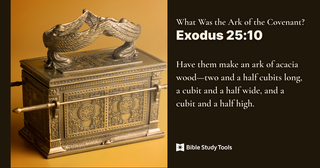
- Recent Translations
- All Translations
Exodus 25:30
Share
Settings
Images for Exodus 25:30

Exodus 25:30 Meaning and Commentary
And thou shall set upon the table shewbread before me
always.
] Which consisted of twelve cakes loaves, set in two rows upon the table, and stood there a whole week, and every sabbath were renewed; and when the old ones were took away, which were eaten by the priests, new ones were set, so that they were always before the Lord; and being continually before him, were called shewbread, or "bread of faces", being always before the face of God. This was a memorial of the goodness of God in daily providing bread for the people of Israel, and was presented to him as a thankful acknowledgment of it, and being the same they ate at their own tables; and this being eaten by the priests, was expressive of the communion between God and them, they being guests of his, and feeding on the same provisions. This shewbread may be considered either as typical of the church and people of God, who are all one bread, ( 1 Corinthians 10:17 ) , these pure and unleavened cakes may denote their purity, simplicity, and sincerity, being without the leaven of malice and wickedness; the number twelve, the twelve tribes of Israel, the whole spiritual Israel of God; their being called shewbread, or bread of faces, the presentation of themselves to the Lord in public worship, and their being ever under the eye and care of God; their being set on the table, their standing in Christ, and security by him, who is the foundation of the apostles and prophets; and being set in rows, their order and harmony; being renewed every sabbath, the constancy of their worship, and the succession of them in all ages; the frankincense put on each row, the acceptance of their persons and services through the incense of Christ's mediation; the border round about them, the power of Christ around them to keep them from falling: or else as typical of Christ himself, of his being the food of believers, the bread of life: the shewbread of fine flour may fitly signify Christ, the finest of the wheat, the corn of heaven, the bread that comes from thence; its quantity, twelve cakes, the sufficiency of food with him, bread enough and to spare for the whole Israel of God; its continuance, the permanency of Christ as the food believers have always to feed upon; the frankincense on it, the gratefulness of Christ to such, to whom his flesh is meat indeed, and his blood drink indeed; and being set for priests, and only for them, may show that Christ is only food to such who are made priests to God: or this may be an emblem of the intercession of Christ, who is the Angel of God's presence, ever before him, and represents the whole Israel of God, for whom he intercedes; and his intercession is continual, he ever lives to make intercession for them, and that is always acceptable to God. The twelve loaves, Josephus F1 says, signify the year divided into so many months.
F1 Antiqu. l. 3. c. 7. sect. 7.